Teacher training, family support, self-efficacy, and achievement motivation a case study of madrasah tsanawiyah Negeri Lubuk Pakam, Deli Serdang, North Sumatera, Indonesia
DOI:
https://doi.org/10.31101/ijhst.v1i1.937Kata Kunci:
Teachers training, family support, self-efficacy, achievement motivationAbstrak
Referensi
Bandura, A. (1994). Self-efficacy. Encyclopedia of human behavior, 4,71-81.
Bandura, A. (1997). Self-efficacy. The exercise of control. New York: Freeman.
Bohlander., George., Snell., & Scott. (2012). Managing Human Resources, 16thed:South Western-Cengage Learning.
Cheng, C. J. (2011. The Relationship among Learning Strategies, Creative Self-Efficacy, Creative Behavior and Creative Learning Effectiveness of the Students Taking Creative Courses in Technological Universities. PhD. thesis of Industrial Education and Technology, National Changhua University of Education. Changhua,Taiwan, R.O.C.
Creswell, J. (2007). Qualitative Inquiry & Research Design: Choosing Among Five Approaches, 2nd ed. California : Sage Publication.
Diharto, A.K., Ismail, Y., Iriantini, D.B., Murtadlo, M.B., & Muafi. (2018). The Role Of Community Based Tourism Based On Local Wisdom Using Online Media, International Journal of Civil Engineering and Technology, 9, 908–915.
Gambir,R.S., Sohi, R.K.,Nanda, T., Sawhney, G.S., & Setia. (2013). Impact of School Based Oral Health Education Programmes in India:A Systematic Review, Journal of Chinical and Diagnostic Research, 7, 3107.
Gartia, Radhakanta. (2012). Correlates of Academic Achievement and Family Environment of Under-Graduate Students, Journal Psychosoc, 7, 139-145.
Ghozali, I., & Latan, H. (2015). Partial Least Squares: Konsep, Teknik dan Aplikasi Menggunakan Program SmartPLS 3.0. Badan Penerbit UNDIP: Semarang.
Hammer, B. (2003). ETS identifies affecting student achievement-Washington update.
Jerusalem., & Schwarzer. (1995). Generalized Self-Efficacy Scale. In J. Weinman, S.Wright and M. Johnston, measures In Health Psychology: A user’s Portfolio. Causal and Control Beliefs, 32-37.
Jong, P.F. (1993). The relationship between students’ behaviour at home and attention and achievement in elementary school, British Journal of Educational Psychology,63, 201- 213
Joshi, Shobhna and Neha Acharya. (2013). Home Environment and Achievement Motivation of Adolescents, Journal Social Science International, 29, 105-120
Kissau,Scott., & Algozzine, Bob. (2014). The Impact of Mode of Instructional Delivery on Second Language Teacher Self-efficacy, Journal European Association for Computer Language Learning, 27, 239-256.
Lee, M., Son, W., & Rho, A. (2007). PISA 2006 results. The Report of Korean of Educational Evaluation
Martono. (2013). Pengaruh Pengalaman Mengajar, Pelatihan Guru, dan Pembinaan Akademis Pengawas TK/SD Terhadap Peningkatan Kemampuan Guru Dalam Menyusun RPP Guru SD Negeri SE Kecamatan Brati Tahun 2012/2013.
Muafi., Suwitho., Purwohandoko., & Salsabil, I. (2017). Human Capital In Islamic Bank and Its Effect on the Improvement of Healthy Organization and Employee Performance, International Journal for Quality Research, 11, 849-868.
Pajares, F., & Schunk, D. H. (2001). Self-beliefs and school success: Self-efficacy, selfconcept, and school achievement. In R. Riding & S. Rayner (Eds.), Perception,239-266.
Priya, anugamini., & Rajib, Lochan. (2015). Training Comprehensiveness:Construct Development and Relation With Role Behavior, European Journal of Training and Development, 39, 641-662.
Siswanti, Y., & Muafi. (2010). The effect of proactive personality, self promotion, and ingratiation on career success for employee of public organization, Global Journal of Management and Business Research, 10, 90-95.
Skaalvir, E.M.,and Skaalvik, S. (2007). Dimensions of Teacher Self-Efficacy and Relations with Strain Faktors, Perceived Collective Teacher Efficacy, and Teacher Burnout, Journal of Educational Psychology, 99, 611-625
Smith. (2015). A Contextual Measure of Achievement Motivation: Significance for Research in Counseling, Ideas and Research You can Use.
Wadsworth. (2003). The Application of Role-Identity Salience to The Study of Social Support and Work-Family Interaction
You and Dang (2015). Effects of Student Perceptions of Teachers Motivational Behavior on Reading, English, and Mathematic Achievement: The 122 Mediating Role of Domain Specific Self-efficacy and Intrinsic Motivation, Journal Child Care Forum, 45, 221-24
Unduhan
Diterbitkan
Cara Mengutip
Terbitan
Bagian
Citation Check
Lisensi
International Journal of Health Science and Technology allows readers to read, download, copy, distribute, print, search, or link to its articles' full texts and allows readers to use them for any other lawful purpose. The journal allows the author(s) to hold the copyright without restrictions. Finally, the journal allows the author(s) to retain publishing rights without restrictions
- Authors are allowed to archive their submitted article in an open access repository
- Authors are allowed to archive the final published article in an open access repository with an acknowledgment of its initial publication in this journal

This work is licensed under a Creative Commons Attribution-ShareAlike 4.0 Generic License.










